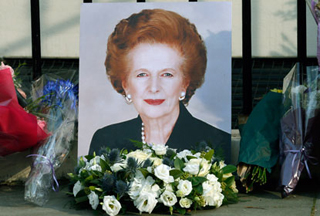With sorrow and jealousy

Due to post-electoral processes international news was pushed backward. And on those days one of the key news was the death of the 71st Prime Minister of Great Britain Margaret Thatcher. The most powerful and famous politician of the mid-20th century died. She was the first enemy of world studentship in the 1970-80s and the first political teacher. She is one of the founders of the current economic and political systems. Because of an article in a Russian military journals “Krasnaya Zvezda” she was nicknamed the “Iron Lady.” “I wasn’t lucky, I gained it,” later wrote Thatcher in her memoirs despite the fact that back then she was neither a Prime Minister nor a military official. I was merely the Minister of Education of Great Britain.
The theory of Thatcherism wasn’t known back then but it was evident that in the near future the international political life would see a conservative, clever and stubborn politician. She was a politician who would never give in to populism and would implement all her goals till the end. Her career and reputation were developed due to the milk issue. Back then in the public schools of Great Britain the 7-11 year old children would receive milk every day free of charge.
Thatcher cancelled this decision in order to spend the budget of the country on other things. The British society was furious. She was even called a milk thief. But the minister was stay stubborn. Back then, the media would write that in the cabinet she was the only “man.” Thatcher didn’t quite agree with this term by opposing that any housewife has a better understanding of the state issues. In 1979 she became a Prime Minister. It was hard to believe that the first female Prime Minister would lead the country till 1992. Her tenure was the longest in the 20th century.
The number of stoppages across the UK peaked at 4583 in 1979, when more than 29 million working days were lost. In 1984, the year of the miners’ strike, there were 1221, resulting in the loss of more than 27 million working days. Stoppages then fell steadily throughout the rest of Thatcher’s premiership; in 1990 there were 630 and fewer than 2 million working days lost, and they continued to fall thereafter.
Trade union membership also fell, from 13.5 million in 1979 to fewer than 10 million by the time Thatcher left office in 1990. A part of the economist considers the theory of Thatcherism people’s capitalism. The government closed 25 unprofitable coalmines in 1985, and by 1992 a total of 97 had been closed; those that remained were privatized in 1994. The eventual closure of 150 coalmines, not all of which were losing money, resulted in the loss of tens of thousands of jobs and devastated entire communities. Miners had helped bring down the Heath government, and Thatcher was determined to succeed where he had failed.
The Prime Minister was changing the structure of the British economy by realizing that a new era has arrived for industrial development. During her tenure she imposed public expenditure cuts on the state education system, resulting in the abolition of free milk for schoolchildren aged seven to eleven. She held that few children would suffer if schools were charged for milk, but she agreed to provide younger children with a third of a pint daily, for nutritional purposes.
Cabinet papers later revealed that she opposed the policy but had been forced into it by the Treasury. She would say, “I don’t care what the ministers are speaking about me. The important thing is that they do my commands.” She wouldn’t give up when the members of the Irish army started a hunger strike in prison (the death of 11 prisoners didn’t affect her decisions).
On 2 April 1982 the ruling military junta in Argentina ordered the invasion of the British-controlled Falkland Islands and South Georgia, triggering the Falklands War. She took charge of the conduct of the war, which had authorized and dispatched a naval task force to retake the islands. Argentina surrendered on 14 June and the operation was hailed a success, notwithstanding the deaths of 255 British servicemen and 3 Falkland Islanders. But she still wouldn’t give up. Many TV viewers of the world, even USSR citizens, had witnessed how she sent the navy to the sea. Only years after, it had become known when she was reporting to the parliament about the death toll there were tears in her eyes.
The British journalists have decided not to publicize the footage when she was crying. Thatcher personally wrote and sent condolence letters to the families of the 50 men fallen at war. She once said, “I am very patient when everything goes my way.” During her tenure the country’s GDP grew by 25% and the number of people living in houses grew by 20%. Thatcher was clearly an anti-Soviet politician.
When speaking to the USSR she was always emphasized her country’s might. USSR was back then led by old and exhausted leaders. In Great Britain, US, France and Germany the leaders were the best of the 20th century – Reagan, Mitterrand, Kohl. By cooperating with these men Thatcher was able to win the most radical enemy – USSR. She liked to repeat, “When you want something to be said go to a man, but if you want something to be done go to a woman.”
By Ara Galoyan

























